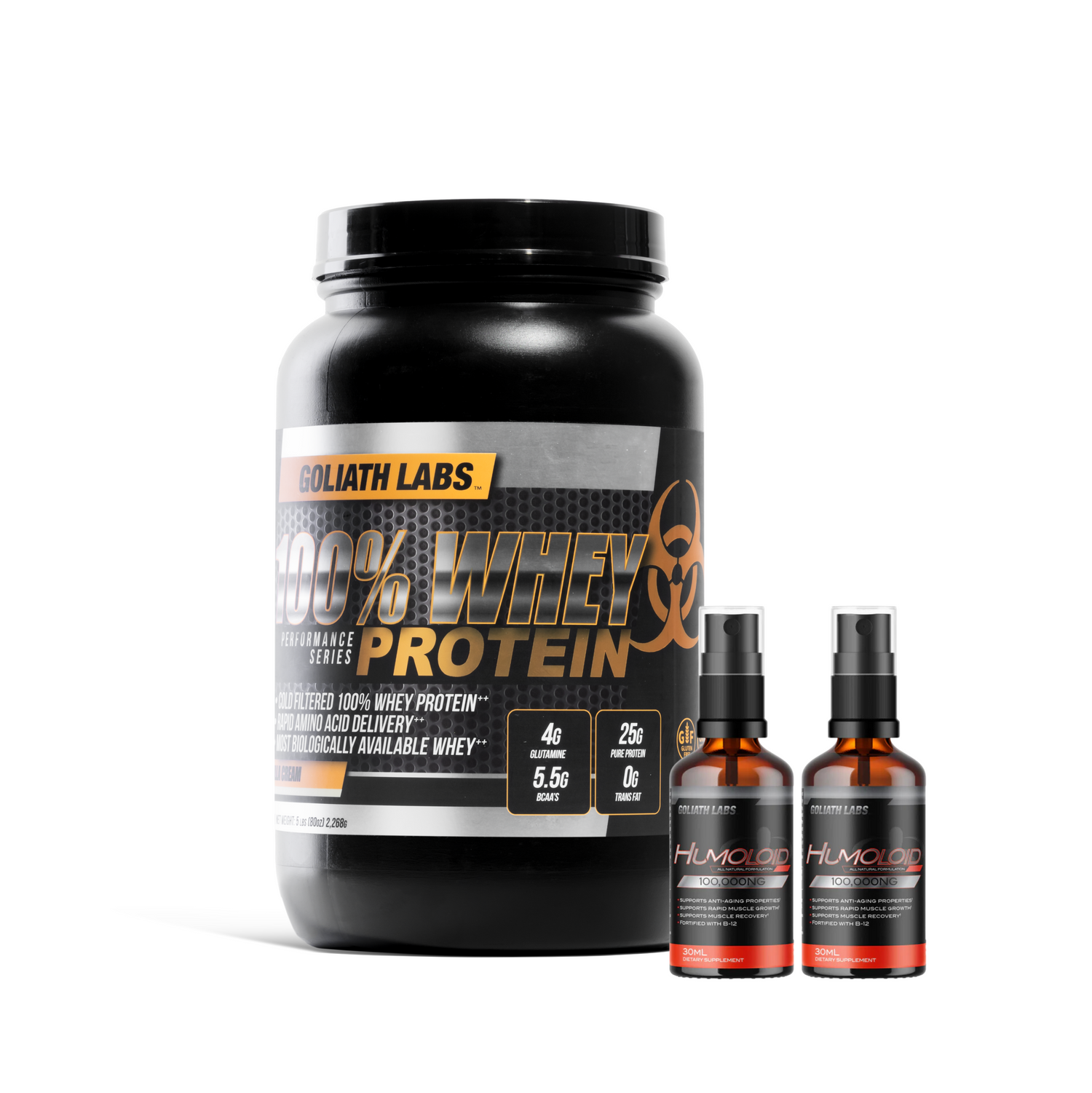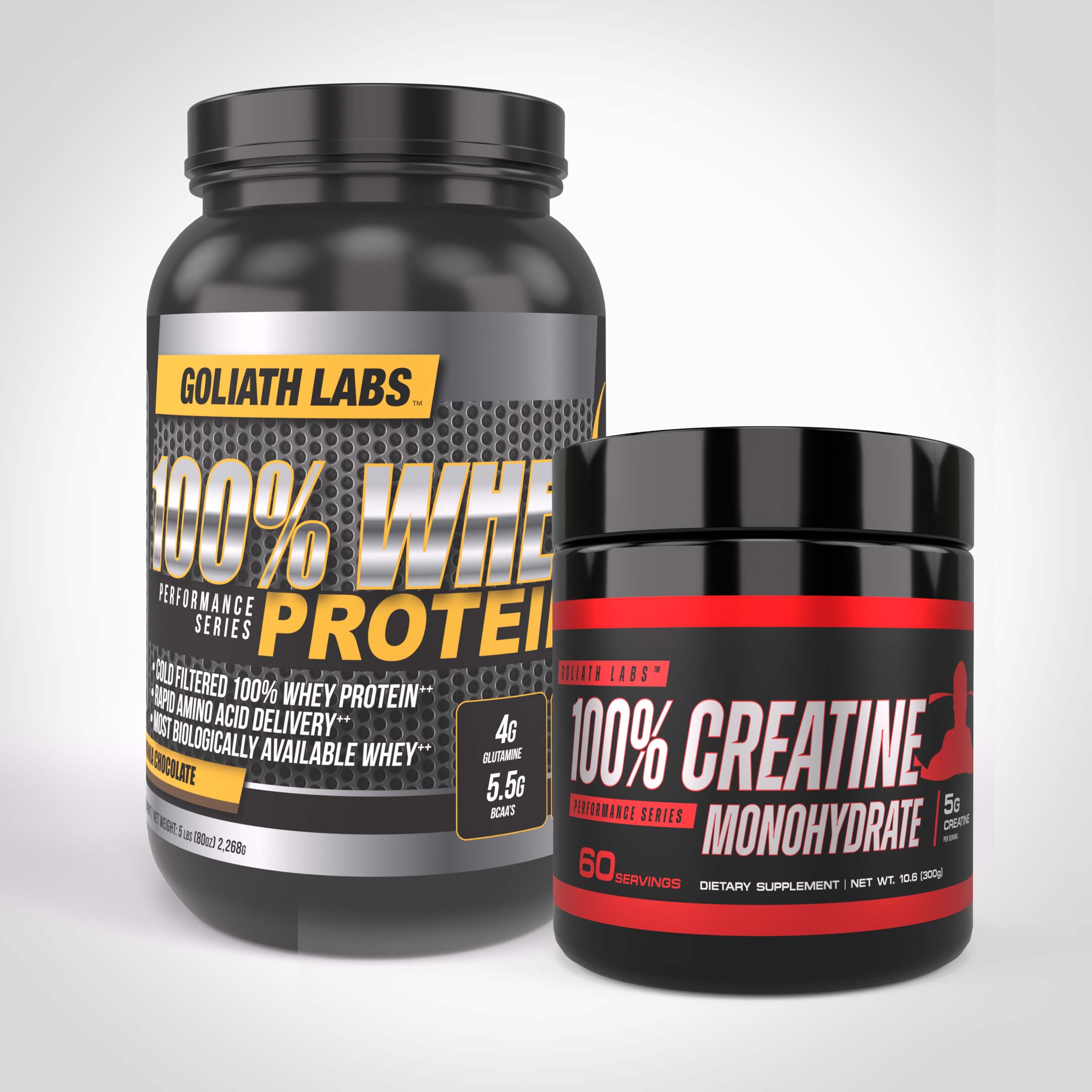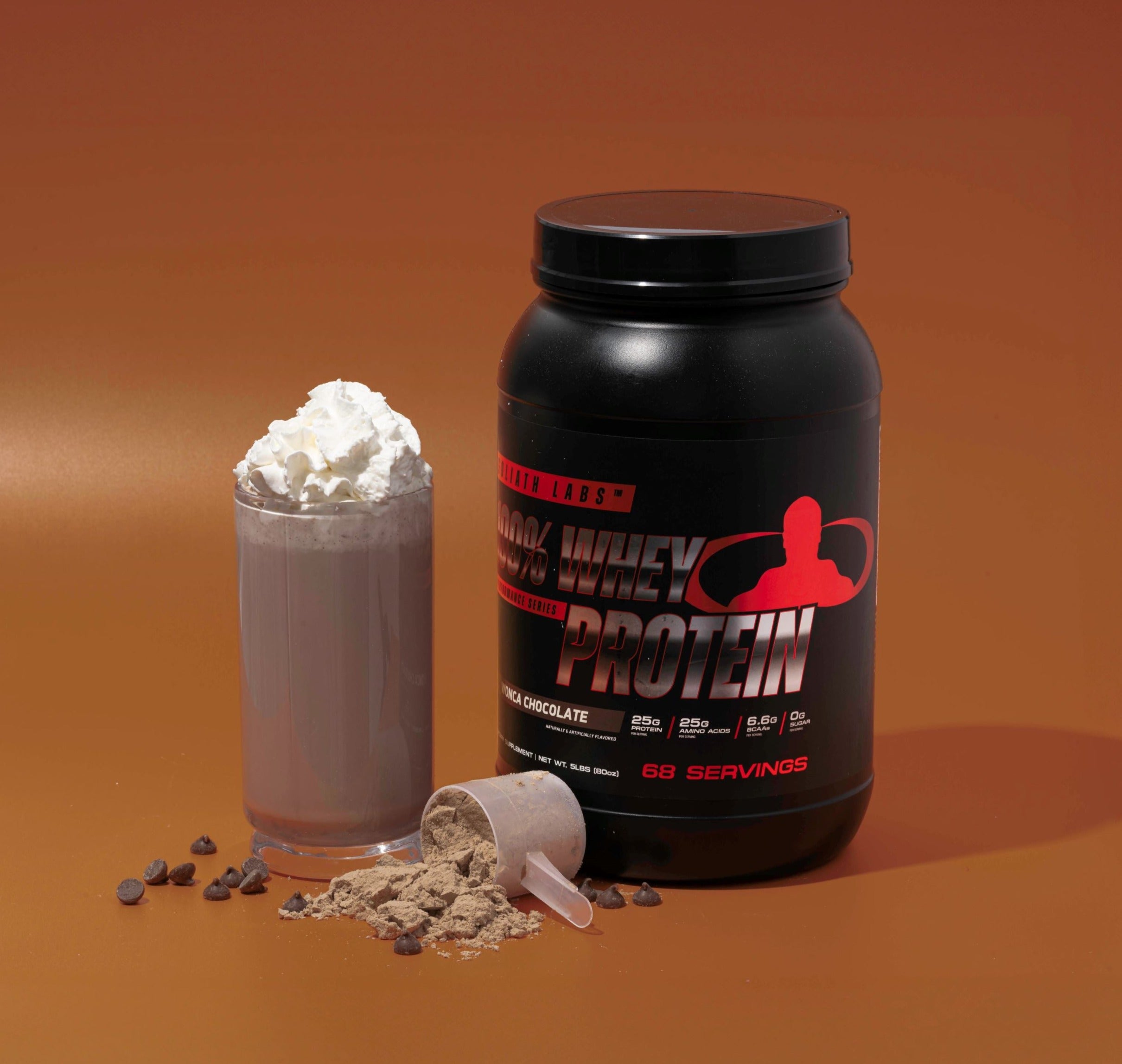You’ve seen it slapped on labels, “undenatured whey”, but what does that really mean?
The supplement industry often recycles scientific terminology without context, turning precise biochemical terms into vague marketing slogans.
“Undenatured” is one of the most misused. It’s presented as a badge of quality, but most consumers have no idea whether it refers to temperature, processing, or nutritional value.
Some brands equate it with "raw," others with "grass-fed," and still others use it to justify inflated pricing. These inconsistencies make it nearly impossible to compare protein powders directly.
In this article, we’ll break down what “undenatured” really means at the structural level, explore how it impacts protein quality, and help you evaluate if it’s worth the investment.
What Is “Undenatured” Protein Powder?
Understanding “undenatured” requires more than scanning a label.
It’s a structural concept rooted in protein chemistry, one that directly influences how your body interacts with what’s in your shake.
Whether you're trying to optimize recovery, support immunity, or simply get the most out of your supplement, knowing how protein is built, and broken down, matters.
The Science of Protein Structure
Proteins are complex biological molecules composed of chains of amino acids.
These chains fold into highly specific three-dimensional shapes, which determine their function. There are four levels of protein structure:
-
Primary structure: the linear sequence of amino acids.
-
Secondary structure: local folding into alpha-helices or beta-sheets.
-
Tertiary structure: the complete 3D shape of a single protein chain.
-
Quaternary structure: how multiple chains interact in a multi-subunit protein.
Denaturation occurs when one or more of these structures is disrupted.
Heat, acid, or mechanical agitation can cause proteins to unfold or realign, altering their original function. A denatured protein is not “bad” or toxic, it still contains amino acids, but it may lose functional peptides that assist with immune signaling, recovery, or antioxidant activity.
This change can also reduce how efficiently your body recognizes and absorbs the protein.
How Protein Gets Denatured in the Real World
Whey protein originates as a liquid byproduct during cheese production.
From there, it's filtered, pasteurized, dried, and packaged. Every step presents an opportunity to alter its structure. Key culprits include:
-
High-heat pasteurization
-
Spray drying above 160°F
-
High-speed blending
-
UV exposure
-
Extreme pH changes
While many brands focus on cold-processing during manufacturing, one often overlooked risk is post-packaging heat exposure.
Even properly handled undenatured whey can begin to denature if left in hot warehouses or during summer shipping. That’s why reputable brands, like Goliath Labs, monitor not just how protein is made, but how it’s delivered.
What Makes Protein “Undenatured”? Is It Better?
What distinguishes undenatured whey from standard varieties isn’t just its protein content, but the integrity of its structure.
True undenatured whey is manufactured using techniques that minimize molecular damage, preserving the bioactive components your body actually needs. This is where “cold-processed” and “cross-flow microfiltration” enter the picture.
Cold Processing & Cross-Flow Microfiltration
“Cold-processed” whey is produced under strictly controlled temperatures, typically kept below 70°C (158°F), to prevent thermal damage to delicate protein structures.
As opposed to high-heat or acid-based methods, cold processing allows protein fractions to retain their native form, critical for biological activity.
Cross-flow microfiltration (CFM) is a mechanical filtration technique that uses ceramic membranes to separate protein from fat, lactose, and impurities without the use of harsh chemicals or extreme temperatures.
CFM doesn’t just isolate protein, it protects it. Unlike ion-exchange methods that compromise peptide integrity, CFM ensures the survival of functional fractions like lactoferrin, immunoglobulins, and alpha-lactalbumin.
At Goliath Labs, we use cold processing and non-denaturing filtration techniques precisely because they protect the structure and efficacy of every scoop.
Key Protein Fractions Preserved in Undenatured Whey
What’s preserved in undenatured whey isn’t just “protein”, it’s biologically active components with defined physiological roles:
-
Immunoglobulins (IgG, IgA): These are antibodies that help modulate immune function. They’re highly sensitive to heat and virtually absent in over processed whey.
-
Lactoferrin: A glycoprotein with antibacterial, antiviral, and anti-inflammatory properties. It also plays a role in gut health and iron metabolism.
-
Alpha-lactalbumin and Beta-lactoglobulin: These are the primary building blocks in whey. They support muscle recovery, influence metabolism, and serve as carriers for vital micronutrients like calcium and zinc.
These fractions are intact in Goliath Labs’ cold-filtered whey, enhancing its function beyond just muscle repair.
The Functional Benefits of Staying Intact
When whey protein retains its full biological structure, the benefits extend beyond standard macronutrient intake:
-
Increased glutathione production: Undenatured whey supports the synthesis of glutathione, a master antioxidant essential for detoxification, cellular repair, and healthy aging.
-
Stronger immune signaling: Bioactive peptides interact with immune cells, helping modulate inflammation and improve resilience.
-
Hormonal optimization: Some men report improved energy and libido when using intact whey, especially when stacked with hormone-supporting formulas like Ejaculoid. These observations align with emerging science showing potential endocrine-supportive effects of lactoferrin and intact immunoglobulins.
Preserving structure means preserving function. And that’s the entire point of choosing undenatured whey: not just to meet a protein quota, but to unlock its full biological potential.
Does Undenatured Protein Help With Muscle or Health Goals?
When evaluating any protein supplement, bioavailability becomes a key metric, but one that’s often misunderstood.
It’s not just about how much protein you consume. It’s about how efficiently your body can absorb, recognize, and use it.
For undenatured whey, this claim to superiority hinges on molecular integrity.
But does the science support the claims?
Bioavailability: Buzzword or Real Edge?
In pharmacology, bioavailability refers to the percentage of a drug that reaches systemic circulation unchanged.
In nutrition, it’s more complex. Bioavailability reflects the proportion of nutrients absorbed and utilized at the cellular level. With protein, this includes digestion, enzymatic breakdown, and amino acid transport across the intestinal wall.
Undenatured whey, by retaining its structural conformation, may be more easily recognized by digestive enzymes, potentially improving absorption efficiency. Some clinical models and in vitro studies support this.
However, real-world digestion is dynamic. Heat and stomach acid will denature protein to some degree regardless of its initial state.
Critics often ask: If digestion denatures all protein, does it matter if it starts that way?
The answer depends on the goal. Even denatured protein provides amino acids. But intact proteins may deliver functional peptides and immune-modulating fractions that are lost during processing or cooking.
Baking with whey, for example, won’t cancel out its protein content, but it can degrade heat-sensitive components like lactoferrin or immunoglobulins.
When Undenatured Whey Might Be Most Useful
-
Fitness beginners looking for overall wellness, not just muscle growth, benefit from the broader functionality of intact whey.
-
People with gut sensitivity often tolerate cold-filtered, undenatured protein better due to fewer additives and preserved bioactivity.
-
Older adults may need higher-quality protein with maximal digestibility and anti-inflammatory support.
-
Strategic timing (post-workout, morning, bedtime) enhances benefits, especially when stacking with other performance formulas
What to Watch Out for When Buying Undenatured Whey
For anyone considering undenatured whey, the biggest challenge isn’t finding a product, it’s knowing what’s real.
The term “undenatured” appears across labels, but without regulation, its meaning is often diluted.
Many brands claim it; few can prove it.
Not All Labels Tell the Truth
Image source - Beaconpoint Labs
The word “undenatured” has no official definition under FDA or industry regulatory bodies.
That means brands can use it loosely, even if the whey has been exposed to high heat or aggressive processing methods. Some powders labeled as cold-processed are still subject to high-temperature spray drying or poor post-manufacture handling, which can negate the benefits entirely.
To verify product integrity, look for transparency.
The best brands disclose their filtration methods, provide third-party testing, and avoid proprietary blends that hide ingredient dosages. If you don’t know what’s in your scoop, it’s not real quality.
Goliath Labs publishes full label specs, uses clinically validated doses, and guarantees structural preservation from sourcing to shelf.
Cost vs. Value
Some shoppers hesitate at the price tag.
They wonder: Is undenatured whey worth the extra dollars? If your only goal is grams of protein per dollar, maybe not. But if you're seeking immune support, digestive tolerance, and hormonal optimization, the added value is measurable.
Undenatured whey isn’t about flash. It’s about function. Look for brands that combine cold-processing with full traceability, strong customer support, and real-world performance.
At Goliath Labs, our formulas are designed to deliver more than macros, they deliver outcomes.
Are There Any Side Effects of Undenatured Protein?
Undenatured whey is generally well-tolerated, especially when sourced from high-quality filtration processes.
It’s still whey protein at its core, meaning it contains the same amino acid profile as traditional products.
However, due to its structural integrity and functional peptide content, there are a few additional considerations to keep in mind.
Generally Safe, But Here’s What to Know
Like all whey proteins, undenatured formulas may cause bloating, gas, or mild digestive discomfort, especially in individuals with lactose sensitivity.
However, most undenatured products use whey isolate or microfiltered concentrate, which significantly reduce lactose content and improve digestion.
For many users, this means better tolerance than standard whey.
Because undenatured whey preserves bioactive peptides and fractions, some sensitive users may experience mild gastrointestinal responses, especially when first introducing the product.
The effects typically subside as the digestive system adapts to the increased peptide activity.
A common concern is whether undenatured whey causes hormonal shifts. There are no synthetic hormones or hormone analogs in properly manufactured undenatured whey.
However, due to the preservation of immunoglobulins, lactoferrin, and alpha-lactalbumin, some users, particularly men, report noticeable changes in energy, drive, and mood.
These effects are not the result of hormonal manipulation but may reflect improved nutrient utilization, gut-immune signaling, or natural testosterone support from bioactive compounds.
Is Undenatured Protein Right for You?
Undenatured whey isn’t just a marketing term, it’s a structural distinction with functional implications.
When processed and stored correctly, it preserves critical protein fractions that support immunity, antioxidant capacity, and hormonal health. It offers more than amino acids; it delivers intact bioactive compounds that your body can recognize and use more efficiently.
This type of protein is ideal for individuals who want more than basic recovery.
It’s suited for those prioritizing immune resilience, better digestion, or age-related hormonal balance. If you value ingredient transparency, label integrity, and scientifically informed formulation, undenatured whey is worth your attention, and investment.
If you feel you could benefit from undenatured protein powder, we invite you to try Goliath Labs 100% Whey Protein, engineered with cold-processing and full structural preservation.



